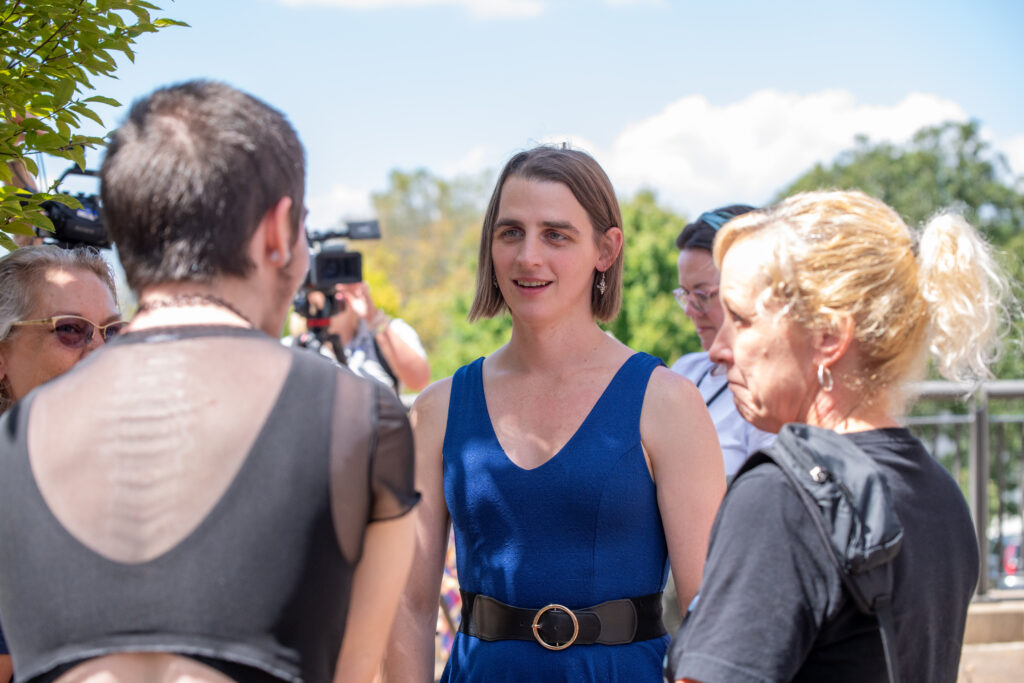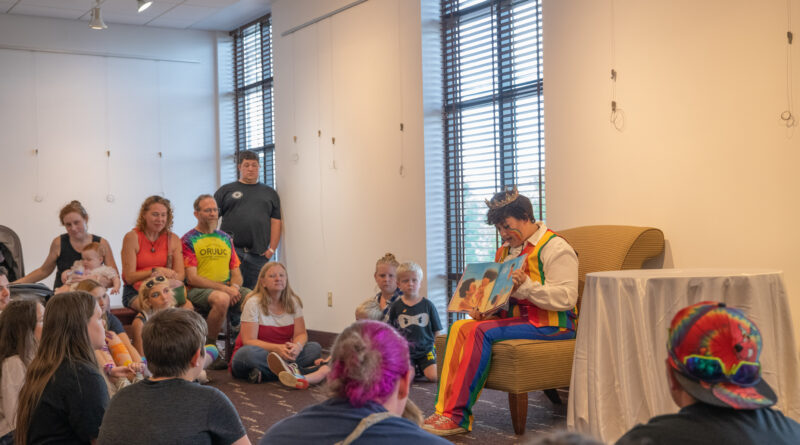Blount Pride festival a success despite political opposition
On Saturday, Sept. 2, Blount Pride took place at the Clayton Center for the Arts (CCA). Despite the jubilant celebration, motorists along Lamar Alexander Parkway witnessed several protesters along the sidewalks outside the college, some holding Bibles or signs that read “End D.E.I. at Maryville College.”
At the CCA, it was a vastly different scene. Colorful booths, activities and vendors were set up to celebrate Blount Pride’s second festival since the COVID-19 pandemic. Community members, students, and MC faculty and staff gathered to support the local LGBTQ+ community. Attendees were more aware than ever of the diverse array of social, political and religious perspectives represented both at the event and among those protesting outside of it.
Earlier this year, the Tennessee Adult Entertainment Act was signed into law by Gov. Bill Lee after passage by the state Legislature. Designed to ban drag and adult cabaret shows in Tennessee in public spaces and where those younger than 18 might be present, the bill was struck down in Shelby County, under the jurisdiction of the West Tennessee federal court.
“[The Tennessee legislature] has definitely made things more interesting. I think that Pride events across Tennessee were waiting for that decision that happened in Shelby County, just to see their path forward,” Shannon Bryant, secretary for Blount Pride, said. “I think that waiting for that decision was huge, and the relief that we felt at that decision was also huge.”
According to MC sophomore Clara Webster, a Political Science major, the decision did not apply in East Tennessee, as the wording of the injunction preventing its enforcement specifically applied to Shelby County. Tennessee Attorney General Jonathan Skrmetti announced the new law was still enforceable in the rest of Tennessee, and Ryan Desmond, DA for Blount County, announced the week before the event that he would be open to prosecuting potential violations of it. Blount Pride, with the assistance of the American Civil Liberties Union and headline performing artist Flamy Grant, filed suit, and U.S. Eastern Tennessee District Court Judge Ronnie Greer issued a similar restraining order preventing the law from interfering with Blount Pride.
“There was a temporary restraining order against law enforcement and the district attorney so that people could not be arrested for performing in drag at the Pride festival,” Webster added.
During Pride, representatives from both sides delivered impassioned defenses of their respective viewpoints, and despite Biblical condemnation of the event, at least one protester—who wished to remain anonymous—said that both sides could theoretically agree to disagree peacefully.
“As long as we treat each other with love and respect, at the heart, that is going to open up the door for a dialogue,” they said. “I think being aggressive, hostile or inflammatory in the way we talk to each other isn’t going to get us anywhere.”

At Pride, however, participants and members of the LGBTQ+ community had a different point of view. Disagreement, sophomore Jackie Manning said, is one thing; attempts to deny or condemn one side’s existence, they added, is another matter entirely.
“There’s something about that radical hospitality here, where in spite of all of these circumstances where there is so much going on against us, we are allowed to be here and allowed to feel safe. That’s something that is extremely Christ-like in virtue, albeit not Christian,” said Manning, who uses she/they pronouns and expressed appreciation for the accepting community within Maryville College.
While this was the reality for the attendees of the event, the common theme for most of the protestors was the argument to “protect the children.”
Pastor Bristol Smith, 26, from Shepherd’s Cove Church in Townsend, stood by the roadside holding his Bible and expressed his hope that someone with differing views would engage in conversation with him. Smith’s opinion resonated with many fellow believers, who nodded in agreement and offered approving “amens” when he said, “If the parents aren’t going to protect the children, we need to protect the children because that’s what Christians do.”
For some individuals, it was important to point out that the perception of Christianity could be just as misinterpreted, especially in settings like the events of Sept. 2 as that of the LGBTQ+ community. Cathy Gleason, a protestor standing with Smith, was adamant that she and her fellow protesters came out because of Christian charity and goodwill.
“God is love,” she said. “God is all love, and the Bible says to do everything in love.”

This statement paralleled the views of those at Pride, with many using the frequently quoted “love is love” as a slogan for the LGBTQ+ community. Other individuals celebrating Pride expressed how religion had shaped their lives, and how Pride and Christianity share many parallels.
“The early Christians were protestors. They were standing up against a regime that was unfair to them, that was hurting them,” Webster explained. “They were standing up against it saying, ‘My beliefs are valid. I deserve to exist.’ I think that’s just in my mind very similar to what’s happening.”
Regardless of how someone identifies or what they believe, the city of Maryville and the communities at Maryville College offer many paths to unite for the common good, compassion and understanding of one another, other participants pointed out.
“Support your queer friends, support your trans friends … they need your help; they need your love; and they need your support,” Manning said. “Even if they aren’t necessarily struggling, we are in a world where it feels like everything is against us.”

